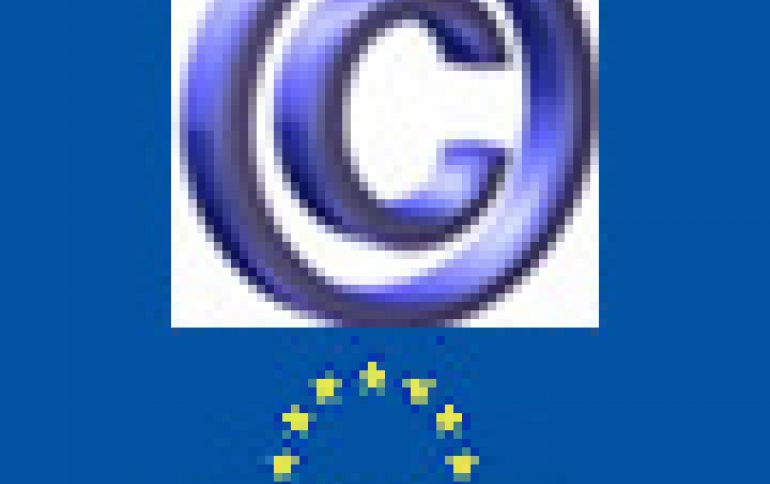
EU Seeks to Harmonising Copyright Law at European Level
Breaches of intellectual property rights (IPR) on the internet are a growing problem for the economy and require a response at EU level, the European
Parliament said on Wednesday.
MEPs recommend the removal of barriers to a single
digital market by granting EU-wide copyright licences
for products like music, books and films.
The "enormous growth of unauthorised file sharing of copyrighted works is an increasing problem for the European economy in terms of job opportunities and revenues for the industry as well as for government", say MEPs.
The provision of an attractive legal range of goods and services might help tackle the problem but the lack of a functioning internal European digital market is a major obstacle.
The Commission is therefore asked to propose a comprehensive strategy on IPR which will remove obstacles to creating a single market in the online environment and adapt the European legislative framework in the field of IPR to current trends in society as well as technical developments.
European countries, including France and the UK, are considering or have recently passed laws that deal directly with the problem of copyright infringement and the internet. The Commission is negotiating on the EU's behalf with a selection of countries on a new international treaty on copyright laws, the Anti Counterfeit Trade Agreement (ACTA).
The Commission is also asked to think broadly about methods of facilitating industry's access to the digital market without geographical borders by addressing urgently the issue of multi-territory licences and the harmonisation of legislation on copyright. A pan-European licensing system should provide consumers with "access to the widest possible choice of content and not at the expense of European local repertoire", says the resolution.
Parliament does not share the Commission's view that the current civil enforcement framework in the EU is sufficiently effective and harmonised. Dialogue on possible solutions must involve all stakeholders, including Internet service providers, say MEPs.
MEPs argue that, in cultural terms, the 'private copy' should be seen as an exception to intellectual property rights. They want individuals who copy originals for private use not to have to prove that their copies are legitimate.
MEPs also call on the Commission to pursue its efforts to make progress on the negotiations for an Anti-Counterfeiting Trade Agreement (ACTA), taking full account of Parliament's position, and to ensure that the provisions of the ACTA fully comply with existing EU rules on IPR and fundamental rights.
Parliament also wants the Commission to set up more intellectual property helpdesks in third countries (notably in India and Russia), to help European entrepreneurs enforce their intellectual property rights more actively and to combat the entry into the EU internal market of counterfeit goods from such countries.
MEPs point out that there is not enough data on breaches of intellectual property rights and they call for independent studies to be carried out before any new legislation is proposed.
Parliament adopted the report by Marielle Gallo (EPP, FR) on Wednesday by 328 votes in favour, 245 against and 81 abstentions.
The "enormous growth of unauthorised file sharing of copyrighted works is an increasing problem for the European economy in terms of job opportunities and revenues for the industry as well as for government", say MEPs.
The provision of an attractive legal range of goods and services might help tackle the problem but the lack of a functioning internal European digital market is a major obstacle.
The Commission is therefore asked to propose a comprehensive strategy on IPR which will remove obstacles to creating a single market in the online environment and adapt the European legislative framework in the field of IPR to current trends in society as well as technical developments.
European countries, including France and the UK, are considering or have recently passed laws that deal directly with the problem of copyright infringement and the internet. The Commission is negotiating on the EU's behalf with a selection of countries on a new international treaty on copyright laws, the Anti Counterfeit Trade Agreement (ACTA).
The Commission is also asked to think broadly about methods of facilitating industry's access to the digital market without geographical borders by addressing urgently the issue of multi-territory licences and the harmonisation of legislation on copyright. A pan-European licensing system should provide consumers with "access to the widest possible choice of content and not at the expense of European local repertoire", says the resolution.
Parliament does not share the Commission's view that the current civil enforcement framework in the EU is sufficiently effective and harmonised. Dialogue on possible solutions must involve all stakeholders, including Internet service providers, say MEPs.
MEPs argue that, in cultural terms, the 'private copy' should be seen as an exception to intellectual property rights. They want individuals who copy originals for private use not to have to prove that their copies are legitimate.
MEPs also call on the Commission to pursue its efforts to make progress on the negotiations for an Anti-Counterfeiting Trade Agreement (ACTA), taking full account of Parliament's position, and to ensure that the provisions of the ACTA fully comply with existing EU rules on IPR and fundamental rights.
Parliament also wants the Commission to set up more intellectual property helpdesks in third countries (notably in India and Russia), to help European entrepreneurs enforce their intellectual property rights more actively and to combat the entry into the EU internal market of counterfeit goods from such countries.
MEPs point out that there is not enough data on breaches of intellectual property rights and they call for independent studies to be carried out before any new legislation is proposed.
Parliament adopted the report by Marielle Gallo (EPP, FR) on Wednesday by 328 votes in favour, 245 against and 81 abstentions.





















